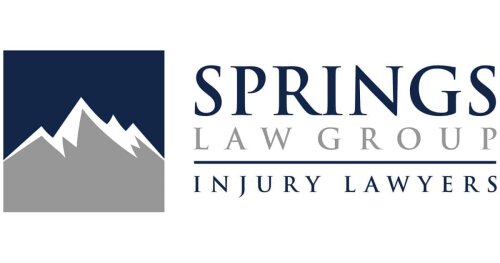
Best Property Insurance Lawyers in Colorado Springs
Share your needs with us, get contacted by law firms.
Free. Takes 2 min.
List of the best lawyers in Colorado Springs, United States

About Property Insurance Law in Colorado Springs, United States
Property insurance is a crucial form of coverage for both homeowners and renters in Colorado Springs. It provides financial protection against damages to a property caused by events such as fires, storms, theft, and other hazards. In Colorado Springs, as in most parts of the United States, property insurance policies are detailed contracts between the property owner and the insurance provider. These policies specify the types of losses covered, exclusions, claim filing procedures, and limits of coverage. Given the potential for natural disasters such as hail storms and wildfires, property insurance is a significant aspect of financial planning and risk management for residents of Colorado Springs.
Why You May Need a Lawyer
There are several situations where individuals in Colorado Springs might require the expertise of a lawyer for property insurance matters. Common scenarios include:
- Claims Denial: When an insurance company denies a claim, a lawyer can help review the policy terms and negotiate with the insurer.
- Underpayment of Claims: If an insurance company underpays a claim, a lawyer can assess whether the payment aligns with policy terms and fair market value.
- Coverage Disputes: These arise when there is a disagreement about what a policy covers. Legal counsel can clarify and advocate for rightful coverage.
- Property Losses Valuation: Lawyers can assist in disputes over the valuation of the property or the cost of repairs.
- Bad Faith Insurance Practices: An insurer might act in bad faith by delaying claims, failing to investigate, or other malpractices. Legal action can address these issues.
Local Laws Overview
Property insurance in Colorado Springs is governed by both state and local laws. Some key aspects to consider include:
- Regulation: Insurance policies are regulated by the Colorado Division of Insurance, ensuring policyholders' rights are protected.
- Statutes of Limitation: Colorado has a statute of limitations that is generally two years for breach of contract involving property insurance claims.
- Valuation Standards: Colorado law requires that damages be assessed based on direct physical loss and often use the replacement cost or actual cash value as a valuation method.
- Reporting and Documentation: Policies are typically strict about timely reporting of claims and maintaining comprehensive records.
- Mandatory Coverage: Certain regions in Colorado may require specific coverage, such as flood insurance, depending on risk zones.
Frequently Asked Questions
What does property insurance typically cover?
Property insurance generally covers damages from natural disasters, theft, and vandalism. Some policies also include liability protection.
Do I need separate insurance for floods and earthquakes?
Yes, standard property insurance policies often exclude flood and earthquake coverage, requiring separate policies.
How can I determine the right coverage amount?
The coverage amount should reflect the replacement cost of your home and possessions, not just the market value.
What should I do if my claim is denied?
Review the denial letter carefully, understand the reason, and consult with a lawyer to evaluate your options and possibly contest the denial.
Can an insurance company cancel my policy?
An insurer can cancel a policy due to non-payment, fraud, or significant changes in risk, but they must provide advance notice and a valid reason.
How do I file a claim?
Notify your insurer as soon as possible, document the damage, gather necessary information, and submit a formal claim following the insurer’s procedure.
What is bad faith in insurance law?
Bad faith involves any unethical practices by the insurer, like denying valid claims, delays, or failing to provide proper communication.
How important is the policy language?
Very important. The terms, conditions, and exclusions defined in the policy determine the scope and limits of your coverage.
What happens during a damage assessment?
An adjuster will be sent to evaluate the damage, during which accurate documentation and cooperation with the adjuster is crucial.
How can I ensure I'm getting fair treatment from my insurer?
Understanding your policy, documenting interactions, and seeking legal advice when necessary can help ensure fair treatment.
Additional Resources
Here are some resources for individuals seeking additional information or support:
- Colorado Division of Insurance: A state agency responsible for overseeing insurance practices and consumer protection.
- National Association of Insurance Commissioners (NAIC): Provides support and regulatory information.
- Local Legal Aid Organizations: These can provide free or low-cost legal advice and assistance.
- American Bar Association: Offers a directory of legal professionals specialized in insurance law.
Next Steps
If you need legal assistance regarding property insurance in Colorado Springs, consider the following steps:
- Gather Documentation: Collect all relevant documents, including your policy, claims filed, correspondence with the insurer, and any other pertinent information.
- Consult with a Lawyer: Contact a lawyer who specializes in property insurance law. Many offer free consultations to discuss your case's basics.
- Understand Your Rights: Make sure you understand your rights and obligations under your insurance policy and local laws.
- File a Complaint: If your issue is unresolved, consider filing a complaint with the Colorado Division of Insurance.
- Consider Mediation/Arbitration: Sometimes disputes can be resolved through mediation or arbitration as a less formal and less costly alternative to litigation.
Lawzana helps you find the best lawyers and law firms in Colorado Springs through a curated and pre-screened list of qualified legal professionals. Our platform offers rankings and detailed profiles of attorneys and law firms, allowing you to compare based on practice areas, including Property Insurance, experience, and client feedback.
Each profile includes a description of the firm's areas of practice, client reviews, team members and partners, year of establishment, spoken languages, office locations, contact information, social media presence, and any published articles or resources. Most firms on our platform speak English and are experienced in both local and international legal matters.
Get a quote from top-rated law firms in Colorado Springs, United States — quickly, securely, and without unnecessary hassle.
Disclaimer:
The information provided on this page is for general informational purposes only and does not constitute legal advice. While we strive to ensure the accuracy and relevance of the content, legal information may change over time, and interpretations of the law can vary. You should always consult with a qualified legal professional for advice specific to your situation.
We disclaim all liability for actions taken or not taken based on the content of this page. If you believe any information is incorrect or outdated, please contact us, and we will review and update it where appropriate.








